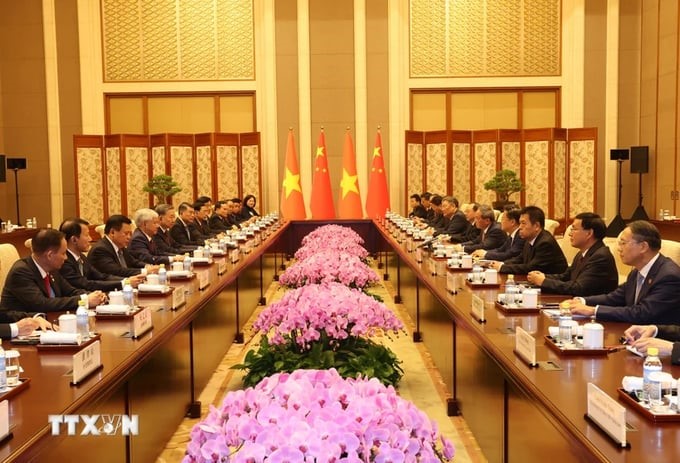- Giới thiệu
- Nhóm Công tác
- Tin tức
- Thông tin về FTA
- Tài Liệu
- Sự kiện
- Liên hệ
China facilitates Vietnam's agricultural exports
Both sides have agreed to work together to strengthen political and economic trust, effectively building a 'Community of Shared Future of Strategic Significance.'
During his State visit to China on the afternoon of August 19, at the Diaoyutai State Guesthouse in Beijing, General Secretary and President To Lam met with Chinese Premier Li Qiang.

Premier Li Qiang expressed deep respect and fond remembrance for the late General Secretary Nguyen Phu Trong’s significant contributions to the relationship between the two Parties and nations.
Premier Li warmly welcomed General Secretary and President To Lam on his first state visit to China, which was also his first foreign visit in his new role. He emphasized that this visit underscores the importance and top priority of the Vietnamese Party and State on the Vietnam-China relationship. Premier Li expressed confidence that this vital visit by General Secretary and President To Lam would inject strong momentum into the Vietnam - China Comprehensive Strategic Cooperative Partnership and that the Community of Shared Future would enter a new stage of development, yielding more substantial results.
Premier Li Qiang reaffirmed that China always prioritizes its relationship with Vietnam as a key direction in its neighborly diplomacy. The Chinese Party and Government consistently support Vietnam in advancing its comprehensive Doi Moi process, accelerating industrialization and modernization, and successfully building a form of socialism suited to Vietnam’s conditions.
General Secretary and President To Lam expressed his sincere gratitude to the Chinese Party, Government, and people for the solemn, thoughtful, and comradely reception extended to the high-ranking delegation of the Vietnamese Party and State.
In an atmosphere of friendship, openness, and trust, General Secretary and President To Lam and Premier Li Qiang reviewed the remarkable achievements in bilateral cooperation in recent years. Both expressed their pleasure and agreed that the relationship between the two Parties and nations has made historic strides, reaching its most profound, most comprehensive, and substantive level to date, with many significant accomplishments: political trust has been strengthened, the level of relations elevated; high-level and multi-level exchanges and contacts have been regularly maintained; trade cooperation has thrived; China's investment in Vietnam has surged; tourism cooperation has recovered strongly; and cooperation between localities and people-to-people exchanges has flourished.
Both sides recognized that the potential for further cooperation remains vast and agreed to work together to enhance political and economic trust further, effectively building a "Community of Shared Future of Strategic Significance" and ushering bilateral relations into a new stage of development along the lines of "6 more": maintaining regular high-level and all-level contacts, fostering exchanges and cooperation between the Party, Government, National Assembly/National People's Congress, and Fatherland Front/CPPCC of the two countries; expanding cooperation in key areas such as diplomacy, defense, and security; promoting substantive cooperation to achieve even greater results; advancing local cooperation and people-to-people exchanges; organizing activities to celebrate the 75th anniversary of the establishment of Vietnam-China diplomatic relations; consolidating a solid social foundation; and creating new momentum for the development of Vietnam-China relations. They also agreed to maintain close coordination, cooperation, and mutual support within multilateral mechanisms and forums.
General Secretary and President To Lam also expressed his hope that both sides would enhance cooperation in the fields of education, culture, and tourism, with a particular focus on restoring tourism cooperation to pre-COVID-19 levels. He also emphasized the need to effectively implement cooperation in disaster prevention, mitigation, relief, and emergency response.
Prime Minister Li Qiang, expressing agreement and appreciation for General Secretary and President To Lam's important suggestions, noted that the two countries should continue to adhere to a cooperative and mutually beneficial development framework. He expressed China's willingness to maintain high-level and all-level exchanges, emphasizing the role of the Steering Committee for Bilateral Cooperation in advancing bilateral relations along the lines of "6 more." This includes strengthening railway transport connections between Vietnam and Europe via China, promoting a feasibility study for the Lao Cai - Hanoi - Hai Phong railway line, and planning the Dong Dang - Hanoi and Mong Cai - Ha Long - Hai Phong railway lines. He also committed to creating favorable conditions for Vietnam to increase exports of high-quality agricultural and aquatic products, as well as seasonal fruits, to China.
Prime Minister Li Qiang suggested that the two sides continue to strengthen neighborly and friendly relations, promote people-to-people and youth exchanges, and implement livelihood projects and cooperation in vocational education and training. He highlighted the importance of the Vietnam-China Friendship Palace and emphasized the need to adhere to genuine multilateralism and open regionalism. He also expressed readiness to enhance cooperation at multilateral forums.
The two leaders also discussed international and regional issues of mutual concern, agreeing to jointly manage and properly handle disagreements, maintain peace and stability at sea, and foster a favorable environment for the development of both countries.
General Secretary and President To Lam proposed that both sides strictly implement the high-level common understanding and the "Agreement on Basic Principles Guiding the Settlement of Vietnam-China Maritime Issues." He emphasized the importance of respecting international law, particularly the 1982 United Nations Convention on the Law of the Sea (UNCLOS), and respecting each other's legitimate rights and interests. He also called for effective promotion of negotiation mechanisms on maritime issues, proper addressing the issue of fishing vessels, and ensuring the stable and positive development of bilateral relations, as well as peace and stability in the region.
Tin liên quan
PSAV Attends the 30th Anniversary Celebration of Cargill Vietnam2025/10/23
Plant health management helps increase coffee yield up to 15%2025/10/16
An Giang to host 2025 OCOP forum for sustainable development2025/09/25
Viet Nam and France foster cooperation on blue economy and sustainable environment2025/09/29



 Điều lệ hoạt động
Điều lệ hoạt động



















































